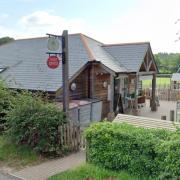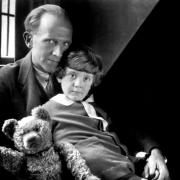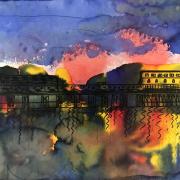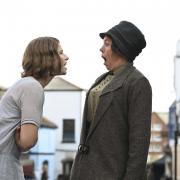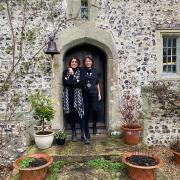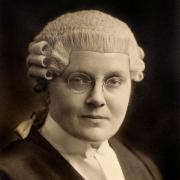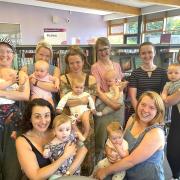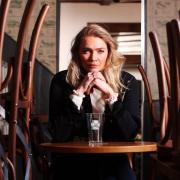To examine the experiences of women in the last 200 years Juliet Nicolson focused on her own family, creating her most personal work to date. Interview by Duncan Hall
“It is necessary to write if the days are not to slip emptily by. How else, indeed, to clap the net over the butterfly of the moment?”
Thus writer Vita Sackville-West summed up her family’s obsession with documenting their world which has carried on through the generations.
And with her new book A House Full of Daughters Vita’s granddaughter Juliet Nicolson is continuing that proud family tradition – using her family’s story to explore the experiences of women from 1830 to the present day.
A print of her grandmother’s inspirational quote is one of the many treasures and keepsakes collected around the 61-year-old historian and journalist’s writing space.
She has taken over the top floor of a converted barn on the grounds of her Alfriston home, with its own kitchen space, comfy sofa and view looking out over her family courtyard and the countryside beyond.
The space bears witness to the journey she went on writing her book, which explores the seven generations of her family from their own letters, journals and even her father’s unpublished memoir – starting with her great-great grandmother flamenco legend Pepita, coming right up to date with her two-year-old granddaughter Imogen.
A table facing her writing desk is packed full of framed pictures of her antecedents. There are sepia portraits of Pepita and her daughter Victoria right up to modern day shots of Imogen.
As if bringing everything full circle the two-year-old’s current loves are dancing, drawing parallels with Pepita, and a fascination with gardening, mirroring Vita’s passion as can be seen today at former family seat Sissinghurst Castle in Kent.
It was her family history which provided Juliet’s way into what initially looked like a project too far.
“I was going to write a book about the seven ages of women,” she says. “I wanted to see how those ages had been different for women over the past 100 years.”
She soon realised documenting the experiences of children, teenagers and women through the Victorian, Edwardian, wartime and modern periods would have created a doorstep of a book.
“It wasn’t defined enough,” she says. “What unites women is daughterhood – everyone is a daughter, whether you’re adopted or an only child, married or not, mother or sister, none or all of those, somewhere in your life there were two people who made you.”
Through exploring her own family history she was able to examine the changes in independence, liberty, choice, freedom and equality for each new generation of women.
She also examines the reaction of the preceding generation – from Pepita’s mother Catalina, who gave everything she could to make her daughter famous only to be sidelined, through to her experiences with her own parents.
“With the preceding generation usually the mother, but sometimes the father, has been puzzled, confused, resentful, jealous, vengeful or proud,” she says.
“With Vita and her mother Victoria, and me and my mother there was a problem.
“Our mothers found it very hard to accept what their daughter had become, and the opportunities they had. My mother left school when she was 14 because of the war and I went to Oxford.
“What was surprising to me was the wonderful relationship which it was possible to have with a father. It made me so pleased to see that continuity in my family.
“My father [Nigel Nicolson, writer, publisher and former Conservative MP for Bournemouth East and Christchurch] was completely inspirational – my love of stories, history and literature all come from him. A love of reading is a great legacy to give a child.”
It was a love shared with her brother, historian Adam Nicolson, who helped proof-read and edit the final manuscript.
“If I write something I need to show it to him,” says Juliet.
“He has this thing called a ‘Praise Sandwich’ – where he’ll say something like: ‘Well done Juliet, that’s marvellous, I didn’t understand a word of it, but you have done really well to finish it’.
“He tells the truth and that’s incredibly valuable to a writer to have a really objective point of view. It’s getting that balance of being able to be honest without crushing the poor person’s confidence.”
Adam was also present for some of the events in the book – although Juliet admits some major moments for her didn’t have quite the same impact on his life. One example was the day the teenage Juliet defied her mother by refusing to lie to her father about the affair she was conducting behind his back.
“Adam always said to me he would remember things in different ways,” she says.
“There are three years between us, so what an eight-year-old will remember is different from a five-year-old. He didn’t ask me to remove anything – in fact he added some things.”
Juliet’s research took her to the former family homes at Knole and Sissinghurst Castle, as well as walking the same Malaga streets as her great-great grandmother Pepita – where her name is still remembered.
But one of the toughest parts of the story was much closer to home – her own battle with alcoholism.
When she speaks to Sussex Life, The Sunday Times is set to run an extract focusing on this part of her story.
“Seeing it in the newspaper taken out of the book someone might be shocked by it, but that’s their privilege,” she says.
“Initially I wasn’t intending to write about that stuff. I was writing about this sequence of daughters in which I would be one. I was going to briefly tell my own story, going to school and university, going into publishing and writing and that would be the end of it.
“Then I realised I couldn’t let myself off the hook. If I had put the rest under such scrutiny I needed to stick with the structure of the narrative.
“It’s a redemptive story which I am part of. I feel for every single one of the women in the book – I have an overriding compassion for them, and myself that I’ve not keeled over.”
Indeed she wasn’t the only person in the family to battle with the bottle – with Vita, Juliet’s mother Philippa and also Pepita succumbing to its charms.
But Juliet has come out the other side and hasn’t had a drink for 18 years.
“Vita wrote in her very confessional memoir [Portrait of a Marriage], which my father published, about deciding to remain with her husband and not elope with her female lover,” says Juliet.
“She wrote this wonderful story of her love for this woman – and in it she says if there is one person reading it who it helps, then it makes telling the story worthwhile. I do hope this helps. Alcoholism is like any addiction – you are able to come through it with help.
“It was Adam and [his wife] Sarah who guided me towards asking for help by saying they couldn’t help me any more. By sharing the experience it might make someone feel less strange and less alone.
“It is scary asking for help – but then you do wonder why you didn’t think to do it before. People are happy to help.”
It was something someone said early in her treatment which resonated with Juliet and made her want to continue the process.
“Someone said to me they were on a flight from life,” she says.
“That sent an absolute chill through me.
“I was only 43 – I was on a flight from life and I was so young, with so much more living to do. I loved my children. I didn’t want to die as I loved life too much.”
She has been very open with her own family about her addiction so says reading about it won’t be a shock to her daughters.
“I wasn’t going to write about it until I was confident it was the right thing to do,” she says. “There was a great deal of thought about whether I wanted to put this out there. I spoke to my brother, my husband and my children – particularly my children.”
A House Full of Daughters is published by Chatto & Windus, £14.99.
More authors…
• Author Kate Mosse on her new Gothic thriller - Internationally-renowned Kate Mosse OBE was suffering authorial burnout after writing the harrowing conclusion to her Languedoc trilogy, Citadel. So, as a palate-cleanser, she wrote Gothic thriller The Taxidermist’s Daughter. Kate spoke to Jenny Mark-Bell
• Brighton author Paul McVeigh on his debut novel - Brighton author Paul McVeigh is a former comedy writer whose debut novel examines the Northern Irish Troubles from the perspective of a 10-year-old boy. It is this year’s City Read and a year after publication it has been translated into three other languages. It is a specific story with a universal message, as Jenny Mark-Bell discovers




